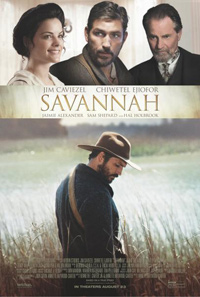Fare is Fowl: Haywood-Carter’s Dire Return to Directing
 Annette Haywood-Carter, perhaps best known for her 1996 directorial debut Foxfire, an adaption of a Joyce Carol Oates novel starring a nubile Angelina Jolie (which was remade in 2012 by Laurent Cantet), returns with her first directorial outing in thirteen years with Savannah, a based-on-a-true-story account of a 1920s hunter from the memoir Ward Allen: Savannah River Market Hunter. Locally produced, the figure in question seems to be a well-known local legend in Savannah, Georgia. However, the headscratchingly vague title should give you the first indication that some beautifully photographed landscape shots are the only aspect of interest in this bewilderingly bland exercise about a highly energetic hunter indisposed to frequent bouts of drinking, best known for rejecting his inheritance to (sometimes illegally) hunt with his black best friend forever at his side.
Annette Haywood-Carter, perhaps best known for her 1996 directorial debut Foxfire, an adaption of a Joyce Carol Oates novel starring a nubile Angelina Jolie (which was remade in 2012 by Laurent Cantet), returns with her first directorial outing in thirteen years with Savannah, a based-on-a-true-story account of a 1920s hunter from the memoir Ward Allen: Savannah River Market Hunter. Locally produced, the figure in question seems to be a well-known local legend in Savannah, Georgia. However, the headscratchingly vague title should give you the first indication that some beautifully photographed landscape shots are the only aspect of interest in this bewilderingly bland exercise about a highly energetic hunter indisposed to frequent bouts of drinking, best known for rejecting his inheritance to (sometimes illegally) hunt with his black best friend forever at his side.
Opening in 1954 Savannah, we meet the wizened Christmas Moultrie (Chiwetel Ejiofor), about to be forced out of the house he lives in due to the property being sold. A close friend, Jack Cay (Bradley Whitford), attempts to relocate the sedentary old man, who seems to only want to tell stories about his deceased friend, Ward Allen (Jim Caviezel), who died mysteriously decades before. Cay’s omniscient narration fills us in on the legend of the rebellious Allen, who had foregone his plantation inheritance to pursue a free life of hunting, meanwhile becoming best friends with Christmas Moultrie, the last slave that had been born into the Mulberry Grove plantation.
We flashback to 1918, where Allen was frequently defending himself in court for his illegal hunting practices, though the affable Judge Harden (Hal Holbrook) would have probably let the energetic and lively Allen get away with most anything. Romance blooms in the form of society maiden Lucy Stubbs (Jamie Alexander), who is forced to leave behind her own family over her father’s (Sam Shepard) disapproval of the freewheeling Allen. However, Allen’s penchant for heavy drinking tempers their romance, and tragedy visits the Allen home. Years later, Moultrie’s stories keep Allen’s memories alive to pass down to other generations, including Jack Cay, who tells his own son about the legendary hunter.
Whatever the idolatry surrounding the enigmatic Allen in his native city/state, there’s certainly nothing engaging about his story as related in Savannah, which plays like a nicely mounted memory specific to one family’s scrapbook. Certainly, a highly notable cast will attract interest, especially considering the supremely talented Ejiofor is about to be seen this fall in the much anticipated 12 Years a Slave. Here, he’s not given much to work with, merely a cipher to celebrate the memorial of his white counterpart. Racism rears its head, but in a quiet manner that’s aggravatingly pedestrian, which only adds to the shallow nature of the material. Some may be reminded, perhaps due to Moultrie’s first name, of Faulkner’s magnificent novel Light In August, a 1930s set Mississippi tale in which a conflicted character of mixed race, Joe Christmas, lives out a tortured existence. Here, Christmas Moultrie is the adoring fan club of the privileged Allen, forced into laughable old man attire, portrayed as having nothing better to talk about decades later than his dead friend.
Worse, rather than taking the time to properly show their friendship, Heywood-Carter spends a majority of the film on the romance between Allen and Stubbs, which is creakingly cliché, and somnambulisticallyrendered. Caviezel, try as he might, gives an embarrassing, histrionic performance, scene chewing through atrociously written passages where Allen drunkenly spouts his thoughts on hunting practices in the bar, or parlays passages of Shakespeare soberly in the court room.
This is Hallmark Hall of Fame material, and it trudges faithfully though one grimace inducing moment to the next (including one particularly painful sequence featuring 30 Rock’s Jack McBrayer as a pretentious hunter from high society). Filled to the brim with forced passages (“It’s like floating in a sea of stars,” moans Alexander on a boating excursion), the still unexplained demise of Allen ends with a tacked on adage from Whitford’s extremely grating narration that “the important thing about a man’s death is how it reflects his life.” If that’s not a confounding enough for you, then please see the end notes which usually reiterate or synopsize the major accomplishments of the subject we’ve just seen; all we get on Allen is that he was hailed as a “champion of common sense game laws.” Besides some nice shots of pristine Savannah, the only moments of grace are the educated Allen’s Shakespearean quips. In the words of Lady Macbeth, “All the perfumes of Arabia will not sweeten this little hand.”


